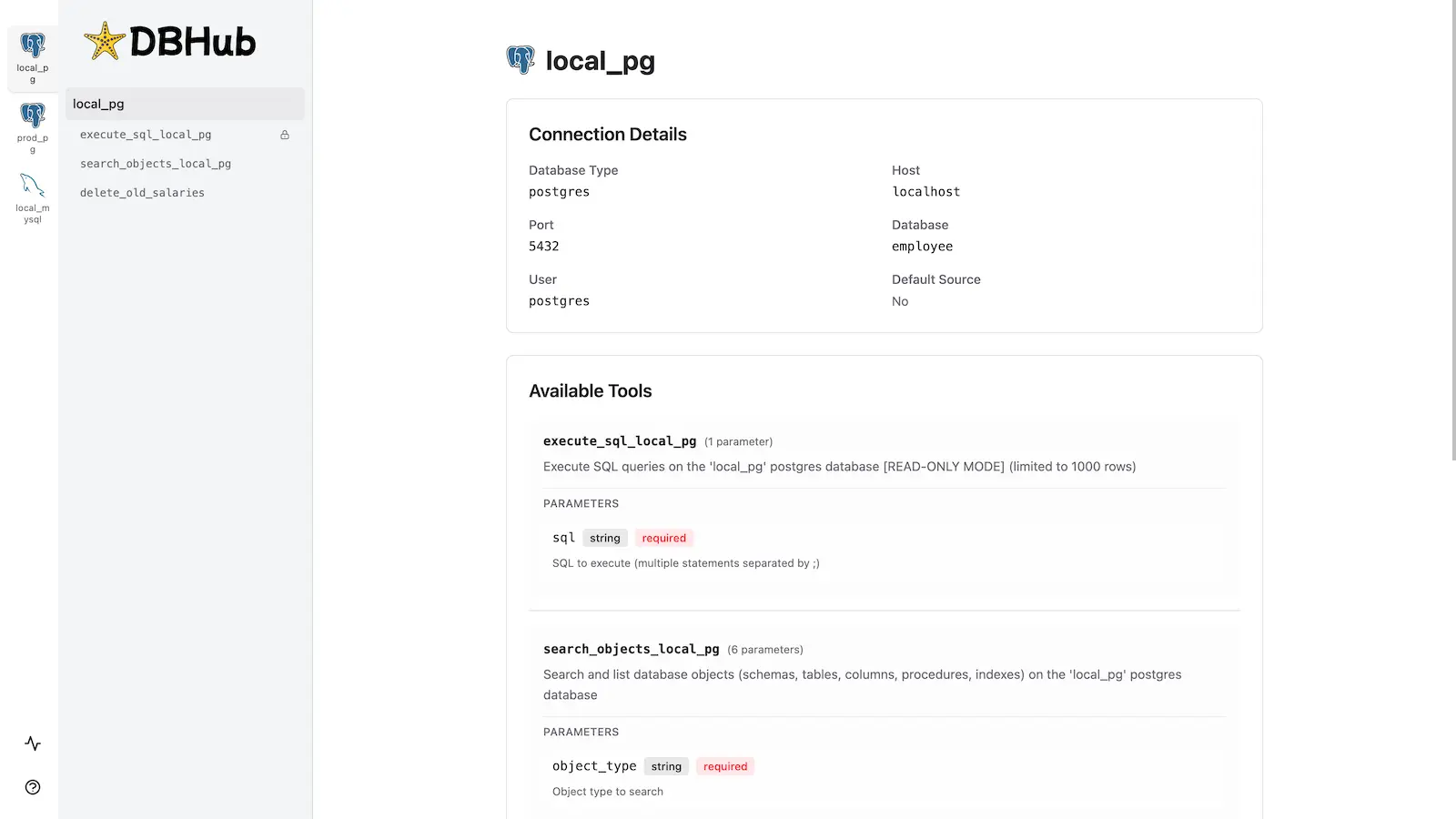DBHub
Universal database MCP server supporting mainstream databases.
[!NOTE]
Brought to you by Bytebase, open-source database DevSecOps platform.
+------------------+ +--------------+ +------------------+
| | | | | |
| | | | | |
| Claude Desktop +--->+ +--->+ PostgreSQL |
| | | | | |
| Claude Code +--->+ +--->+ SQL Server |
| | | | | |
| Cursor +--->+ DBHub +--->+ SQLite |
| | | | | |
| VS Code +--->+ +--->+ MySQL |
| | | | | |
| Copilot CLI +--->+ +--->+ MariaDB |
| | | | | |
| | | | | |
+------------------+ +--------------+ +------------------+
MCP Clients MCP Server Databases
DBHub is a zero-dependency, token efficient MCP server implementing the Model Context Protocol (MCP) server interface. This lightweight gateway allows MCP-compatible clients to connect to and explore different databases:
- Local Development First: Zero dependency, token efficient with just two MCP tools to maximize context window
- Multi-Database: PostgreSQL, MySQL, MariaDB, SQL Server, and SQLite through a single interface
- Multi-Connection: Connect to multiple databases simultaneously with TOML configuration
- Guardrails: Read-only mode, row limiting, and query timeout to prevent runaway operations
- Secure Access: SSH tunneling and SSL/TLS encryption
Supported Databases
PostgreSQL, MySQL, SQL Server, MariaDB, and SQLite.
MCP Tools
DBHub implements MCP tools for database operations:
- execute_sql: Execute SQL queries with transaction support and safety controls
- search_objects: Search and explore database schemas, tables, columns, indexes, and procedures with progressive disclosure
- Custom Tools: Define reusable, parameterized SQL operations in your
dbhub.tomlconfiguration file
Workbench
DBHub includes a built-in web interface for interacting with your database tools. It provides a visual way to execute queries, run custom tools, and view request traces without requiring an MCP client.

Installation
See the full Installation Guide for detailed instructions.
Quick Start
Docker:
docker run --rm --init \
--name dbhub \
--publish 8080:8080 \
bytebase/dbhub \
--transport http \
--port 8080 \
--dsn "postgres://user:password@localhost:5432/dbname?sslmode=disable"
NPM:
npx @bytebase/dbhub@latest --transport http --port 8080 --dsn "postgres://user:password@localhost:5432/dbname?sslmode=disable"
Demo Mode:
npx @bytebase/dbhub@latest --transport http --port 8080 --demo
See Command-Line Options for all available parameters.
Multi-Database Setup
Connect to multiple databases simultaneously using TOML configuration files. Perfect for managing production, staging, and development databases from a single DBHub instance.
See Multi-Database Configuration for complete setup instructions.
Development
# Install dependencies
pnpm install
# Run in development mode
pnpm dev
# Build and run for production
pnpm build && pnpm start --transport stdio --dsn "postgres://user:password@localhost:5432/dbname"
Contributors
Star History
Related Servers
Kintone Lite
A lightweight server to connect AI assistants with Kintone applications and data.
PubChem-MCP
Access PubChem's database for chemical compounds, substances, and bioassays.
Amazon Neptune
Query Amazon Neptune databases using openCypher, Gremlin, and SPARQL. Supports both Neptune Database and Neptune Analytics.
DynamoDB-Toolbox
Leverages your Schemas and Access Patterns to interact with your DynamoDB Database using natural language.
MongoDB Atlas
A server for managing data in MongoDB Atlas, providing secure and scalable data management through RESTful APIs.
SQLAlchemy ODBC
An MCP server for connecting to any ODBC-compliant database via SQLAlchemy, supporting various DBMS backends.
Qdrant Memory
A knowledge graph implementation with semantic search powered by the Qdrant vector database.
Federal Reserve Economic Data
Access financial datasets from the Federal Reserve Economic Data (FRED) API.
MySQL
A server for managing MySQL databases.
Superset MCP Server
Manage Apache Superset datasets, metrics, and SQL queries.